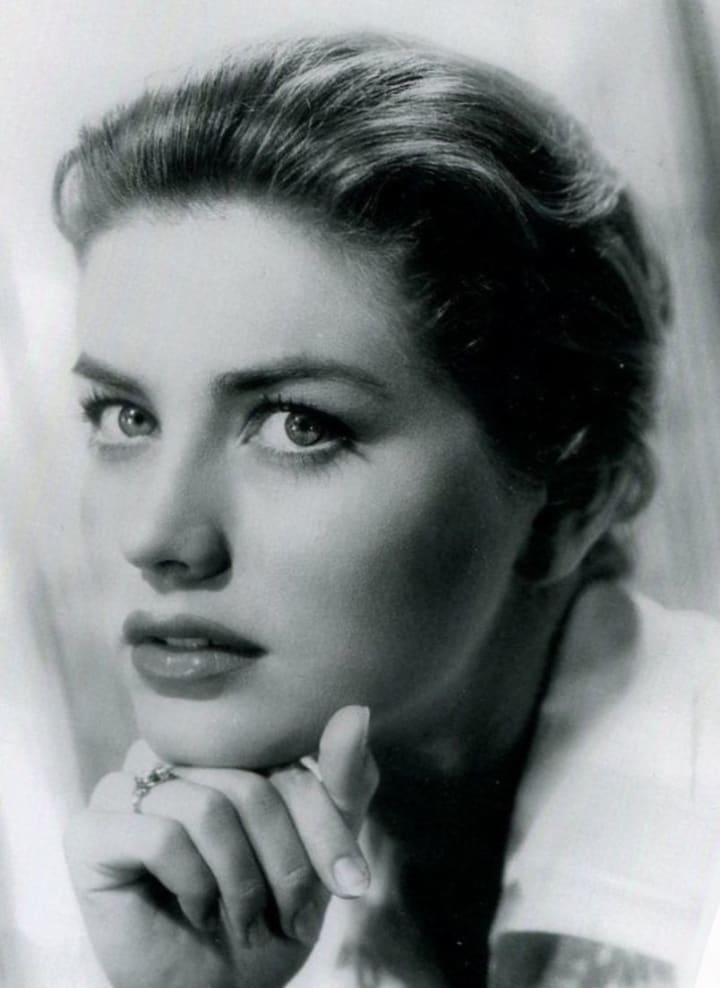The Hollywood Actress Who Became A Nun
The remarkable true story of Dolores Hart

On February 26, 2012, an unlikely figure appeared at the annual 84th Academy Awards.
Amid the crisp tuxedos and sequin evening gowns stood a 73-year-old Roman Catholic Benedictine nun wearing a modest habit, complete with a dark veil and wimple. She walked down the famous red carpet surrounded by acclaimed celebrities such as Meryl Streep and Brad Pitt, pausing once or twice for interviews with stunned onlookers.
Years before, she had been on track to become one of the most celebrated actresses of her time, acting as the on-screen love interest of Elvis Presley in movies such as Loving You and King Creole.
At the height of her career, she was earning jaw-dropping amounts of money and deemed “the new Grace Kelly.” Hart was a beautiful young woman earning attention from the hotshots of 1960s Hollywood.
She went on a date with the English comedian Peter Sellers, who disturbingly returned to her hotel room naked, though was promptly sent away. When she and Elvis Presley shared an on-screen kiss, he couldn’t stop blushing. As she traded Hollywood for a quaint convent, rumours swirled she had borne the King of Rock’s child, despite this gossip being completely fabricated. She later became engaged to her longtime sweetheart, Los Angeles businessman Don Robinson.
But on this day on the red carpet, she was not accepting an award for her extensive acting work.
Mother Dolores Hart — or Dolores Hart, as she had been known by her doting fans of the 1950s and 60s — was attending the prolific award show because of the HBO documentary God Is The Bigger Elvis. The documentary detailed the elderly nun’s life: one that seems both unbelievable and inspiring.
Early Life

Dolores Hart was born Dolores Hick to parents Bert and Harriet Hicks on October 20, 1938.
Her parents were only teenagers when they had their daughter. When she was only three-years-old, Dolores’ father left Chicago for Hollywood as he dreamed of becoming a movie star.
Likely because of her turbulent home life, young Dolores was cared for by her grandmother in Chicago. As Dolores later recalled, her grandmother was concerned about her granddaughter safely traveling to school and subsequently enrolled her in a Catholic one, noting: “She didn’t want me to cross the railroad tracks to get to public school.”
Dolores’ enrollment in Catholic school combined with her desire for stability amid an uncertain home life motivated her conversion to Catholicism at just age 10. She later jokingly added the children who received the Eucharist — a Catholic tradition meant to remember the death of Jesus Christ — were given chocolate milk and doughnuts.
Dolores grew fond of the movies because her beloved grandfather worked as a movie theatre projectionist. She would accompany her grandfather to work, watching many films without sound so as not to wake him from his naps. Then she would wake him whenever the film ended.
Upending the comfortable life she lived in Chicago with her grandparents, Dolores and her parents moved to sunny Los Angeles. Soon after, Bert and Harriet divorced, and the latter remarried a deli owner named Al Gordon.
In the Spotlight

When Dolores and her family moved to Los Angeles, the Golden Age of Hollywood was arguably in its zenith.
Following the devastation wrought by the Great Depression and the Second World War, people were yearning for entertainment. Television sets were not yet mass produced, so many took advantage of the improving post-war economy to frequent the movie cinemas that pervaded American cities and towns.
Major production studios such as MGM scouted beautiful young women and swoon-worthy young men for their films, molding them into the perfect archetypes of what Hollywood represented.
The provocative music and performance style of young rock singer Elvis Presley was sending gigantic shock waves through the conservative core of America. The previously poor Memphis-born musician’s newfound success epitomized the changing social attitudes in the United States.
Eighteen-year-old Dolores — who changed her surname to Hart — came to inhabit this glamorous and sometimes precarious world when she was cast as Elvis’s romantic interest in the musical drama film Loving You. Attending Marymount College, she admitted she knew little about who Elvis was, to the shock of her classmates.
Despite her naivety, Dolores was swiftly catapulted into immediate fame. Along with her obvious external beauty, she possessed the intangible qualities characterizing the leading ladies of her era, and was likened to the famed Grace Kelly on over one occasion.
In rapid succession, Hart starred in productions ranging from Broadway plays to the original spring break movie, Where the Boys Are. Along with several films with Elvis, she acted alongside names such as Montgomery Clift, Cosmo Sardo, Robert Wagner, Connie Francis and Dawn Addams.
On some of her days off, Hart stayed at the Abbey of Regina Laudis in Connecticut. The quiet tranquility of the convent seemed to offer a refuge from the grueling work expected of Hollywood actors. In an interview with ABC News, Hart recalled:
“You work intensely for maybe eight to 10 weeks. And then you break. And you never see the person again. It’s terrible … I think that’s one of the most anguishing parts of Hollywood.”
In 1960, Dolores was set up on a blind date by friends with Don Robinson, a Los Angeles businessman. Like Hart, he was a staunch Catholic who attended mass almost daily and a Loyola University graduate. Robinson fell head over heels for the young actress and proposed marriage.
Their wedding was expected to be an event of the century, with Edith Head — the most celebrated female costume designer in Hollywood history — designing Dolores’ wedding dress from a bolt of antique Spanish lace. Wedding invitations were printed and sent, but despite the fairy-tale unfolding in front of her — she wasn’t content.
A Change of Heart

Near the end of her acting life, Hart was cast in Francis of Assisi — a film that would arguably become the most defining of her career, despite being a box-office loss.
In the movie, Hart plays Clare, a young aristocratic woman who leaves her earthly possessions to become a nun. During filming, she was awarded a papal audience with Pope John XXIII, who greeted her as “Chiara” or Clare, despite Hart’s protestations that she was really Dolores. This was a foreshadowing of the life Hart would eventually choose.
During this time, Hart became conflicted about her feelings for Hollywood and marriage. Though she described neither as inherently bad — she had enjoyed her time as an actress and loved Robinson deeply — she was repeatedly drawn to the Abbey of Regina Laudis and the appeal of a life of service.
Robinson noticed her angst and, during an engagement party thrown by her parents, he supported her decision to return to the Abbey to figure things out. When she admitted her desire to become a nun, he was heartbroken, but supported her all the same.
To the profound disbelief of Hollywood, Dolores Hart announced her decision to join the convent and dedicate the rest of her life to God. Many believed she was abandoning her seemingly perfect life to hide a pregnancy or some other terrible secret.
In reality, Hart desired to find communion with God. She did not know what life at the convent entailed. She struggled with adapting to the new work required of her, crying herself to sleep every night for the first three years.
Regardless, her life at the convent slowly gained stability and regularity. She used her gifts to contribute to the vibrant community at the convent — which boasts pastures, hay fields, orchards, music and art.
She was visited every year by her dear friend Don Robinson, who never married. He described Hart as the love of his life.
Present Day
Today, Mother Dolores Hart has spoken of her decision to leave Hollywood and a life others can only ever dream of as both mysterious and necessary.
Many question Hart’s transition from the glittering lights and glamour of the film industry to a life of hard manual labor and solitude. Hart herself admits she didn’t at first understand why God was calling her to the convent, but notes:
“I have struggled with this call to vocation all my life. I can understand why people have doubts, because who understands God? I don’t. When you are dealing with something at this level, you are dealing with mystery.”
About the Creator
Ilana Quinn
I am a student who loves writing about history, travel, faith and life experiences. Feel free to check out more of my writing at https://linktr.ee/ilanaquinn :)






Comments
There are no comments for this story
Be the first to respond and start the conversation.